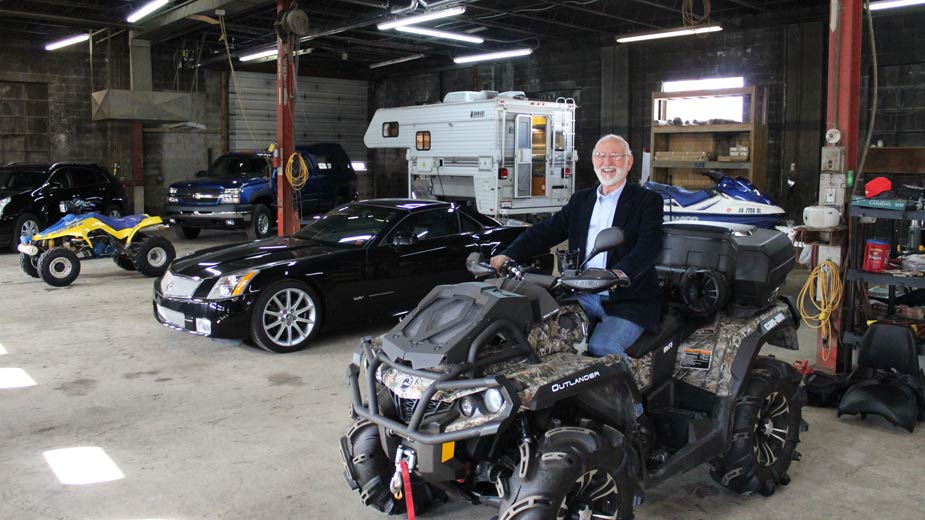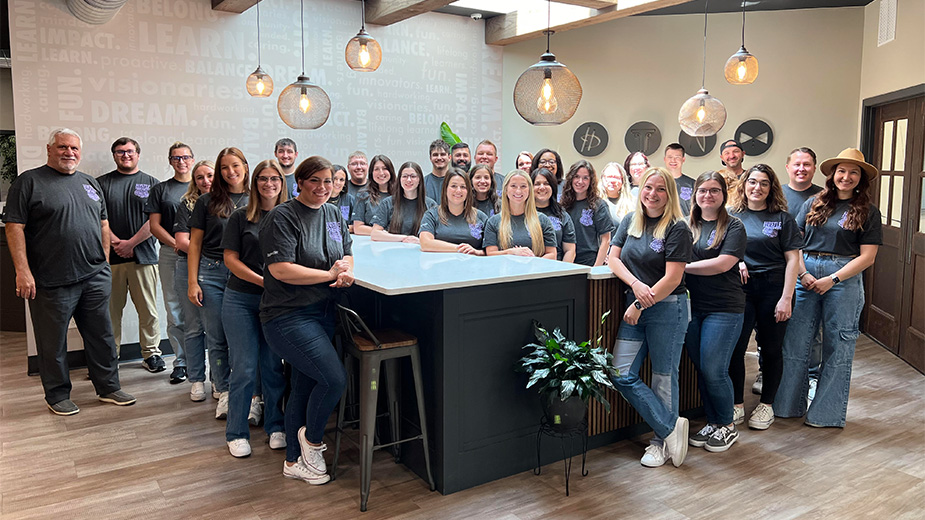It Takes More than Rapid Patter to Be an Auctioneer
YOUNGSTOWN, Ohio — It’s the part of the business everyone knows.
At an auction, whether for an incredibly rare car or an everyday piece of machinery, the bid caller stands at the front of the room, a stream of jargon flowing out of him. For auction-goers, it can be tough to understand at times, but it all means something and is among the first things soon-to-be auctioneers learn during their training.
“It starts very slowly. You start out learning chants: Oneoneonedollarbid. Twotwotwodollarbid. Threethreethreedollarbid,” explains Paul Basinger, owner of Basinger Auction Service in North Lima.
“And then you move onto tongue twisters and work on getting speed in and different increments. The filler words are what keep the rhythm. Bid-twentyfivebidhimatthirtycanyoubidfortyfive. And we talk to our ringmen through those filler words.”
Occasionally, the bid callers converse with the audience or emphasize words to build excitement, all before slamming the gavel.
“The numbers are the most important things. Everything in between is mostly just repetition,” says Ken Baer of Baer Auctioneers Realty. “I don’t even think about it any more.”
But, like any job, for every exciting facet, there are the parts that are less fun.
To get a license in Ohio, auctioneers must know the ins and outs of auction advertising, contract law, how to properly maintain escrow accounts, the different types of auctions and be knowledgeable about what they’re selling, whether it’s antiques or guns or cars. When it comes to hosting an auction, efficiency is what’s stressed.
“Tools, antiques, small items we can usually sell 100 or 150 in an hour. For real estate, it might take 15 minutes, half an hour to sell one piece. So you slow it down a little bit,” Baer says.
For ringmen – the auction workers who roam the floor looking for bidders – there’s a bit of quick salesmanship that has to be done, says Chris Roman, an auctioneer at Canfield’s George Roman Auctioneers.
“We’ll go around and remind them of the positive attributes of the building: the square footage, the location, aspects of the property,” he says. “We’re upselling the property and encouraging them to bid and giving them reasons why they want to bid. It’s about getting them to raise their hand again.”
Before the licensing test, auctioneers have to apprentice for one year and conduct at least 12 auctions. Before their apprenticeships, they must attend one of the 10 auction schools approved by the state of Ohio and then pass an apprenticeship test.
Among the topics covered during apprentice school – there are five in Ohio approved by the state Department of Agriculture – are marketing, presentation, finances and some basics on how to read body language.
“We can almost tell when you’re ready to bid again just on eye movement or body movement. So there’s learning to know your buyers,” says Basinger, who has taught classes at Indianapolis’ Reppert Auction School. “Some are flamboyant and throw their arms up and some are just motioning a little with their finger.”
Once an auctioneer has his license, he can conduct auctions in the Buckeye State and, thanks to reciprocity agreements, in 15 other states that include Pennsylvania, Indiana, West Virginia and Kentucky with approval from the Ohio board.
To auction real estate, he must have a real estate license as well.
While Ohio doesn’t require continuing education, some choose to take advantage of certifications offered by groups such as the National Auctioneers Association or Professional Ringmen’s Institute.
Among the former’s offerings are Accredited Auctioneer Real Estate, Certified Estate Specialist and Benefit Auctioneer Specialist.
Each specialty in the auction business is different. Tobacco auctions have their own terminology as do auto auctions.
At estate auctions, items should be marked and organized in certain ways. The purpose behind an auction at a business differs from charity events.
“When people come [to liquidation auctions], they’re here to buy equipment they wanted for a job. They weren’t there for a fun day,” Basinger explains. “At a benefit auction, people are there for a special occasion. … All of our goals there are how to get people to give the most money.”
Beyond those tests and certifications is a set of soft skills that all auctioneers must have.
“First and foremost, someone has to have interpersonal communication skills,” says Dick Kiko Jr., CEO of Kiko Co. in Canton. “They have to be somewhat of an entertainer or have the charisma to get in front of a crowd. If you’re afraid of public speaking, odds are you won’t be a good auctioneer.”
Adds Chris Roman, an auctioneer at George Roman Auctioneers, “You have to be an honest person because people are trusting you, a lot of times, with their life belongings.”
It’s this trait that comes up time and time again when auctioneers discuss what they look for in young employees who want to become auctioneers.
In a business where buyers are the ones who set the price and clients determine what’s on the market, auctioneers serve as middlemen and don’t have absolute control over either side.
Trust enters during the valuation of the properties.
“We take a $200,000 house or a half-million-dollar farm and when we put it out there, it’s going to sell at the end,” Baer explains. “The buyers set the price, but if you don’t appraise it right, you won’t get close on numbers.”
If there’s too big a disconnect between expectations and selling price, that trust erodes.
And in a field where new clients often come in through word of mouth, that’s a risk that can’t be afforded. In building that trust, knowledge is invaluable.
“You have to be a judge of what the market is, whatever the item is, even if you’ve never sold it before. It’s not something that can be computerized to any extent,” Baer says. “[Appraisal] is experience, mostly. You can look around on the internet but it’s mostly experience.”
Appraising items is, at best, an inexact science, Kiko adds.
“An appraisal is information that helps all of us – auctioneer, buyer, seller – estimate market value,” he says. “Appraisals are critical research to set expectations. The challenge is the marketplace changes every minute, every second.”
When auctioneers can combine product knowledge, soft skills, salesmanship and entertainment, the result is a true representation of market value, the auctioneers agree.
“As far as I know, we have not found a record price for real estate, furniture, diamonds or cars that wasn’t set at an auction,” Basinger says. “A Ferrari recently sold at auction for $30 million. What makes it so valuable? Two people want it but there’s only one.”
And for those looking to get rid of items, auctions can be the best way, Kiko adds.
“When you’re selling it, you’ll get a fair price because people will exhaust the market and the highest bidder gets it,” he says. “It’s the fairest way to buy and the fairest way to sell.”
Pictured: Learning to call bids starts with chanting before adding in tongue twisters, says Paul Basinger of Basinger Auction Service.
Copyright 2024 The Business Journal, Youngstown, Ohio.


